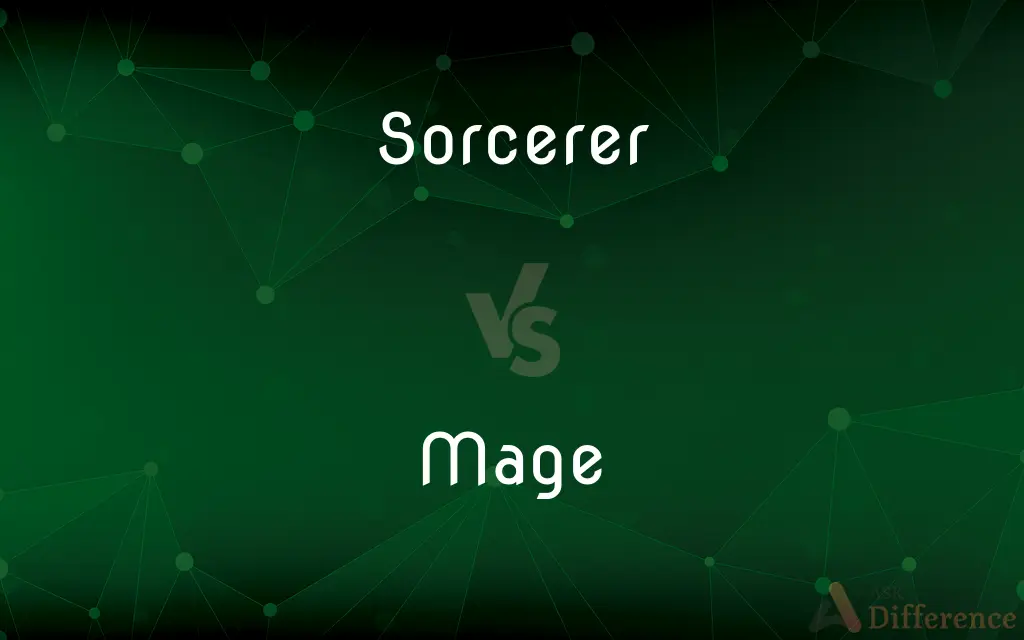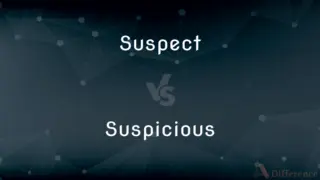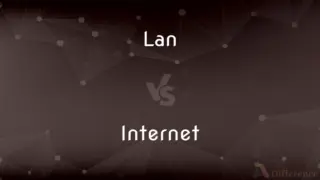Sorcerer vs. Mage — What's the Difference?
Edited by Tayyaba Rehman — By Fiza Rafique — Updated on November 2, 2023
A sorcerer is often depicted as a wizard with innate magical powers, while a mage is a general term for a practitioner of magic.

Difference Between Sorcerer and Mage
Table of Contents
ADVERTISEMENT
Key Differences
Sorcerers are frequently characterized as individuals who possess innate magical abilities, potentially tapping into arcane power without formal training. Mages, conversely, are typically portrayed as scholars of the mystical arts, often with a comprehensive study and disciplined approach to magic.
In many fantasy settings, a sorcerer's power is seen as a natural extension of their being, sometimes born with the ability to channel magic. Mages, however, might require years of study, using spells and incantations learned through extensive research.
Literature and folklore often portray sorcerers as mysterious or even slightly ominous figures due to their inherent powers, which can be seen as unpredictable. Mages, though, are usually viewed as learned and wise, associated with the learned pursuit of magical lore.
In popular culture, the term sorcerer might evoke a sense of wild, untamed power, possibly with a connection to darker forces. The mage, on the other hand, could be associated with a wider range of magical practices, with a neutral or even benevolent connotation.
While both sorcerers and mages are integral to fantasy genres, they symbolize different archetypes within the realm of magic users. The former is often a natural-born wielder of magic, while the latter is a product of education and discipline in the magical arts.
ADVERTISEMENT
Comparison Chart
Source of Power
Innate ability, self-taught
Learned, studied
Depiction in Media
Often darker, more individualistic
Typically scholarly, wise
Typical Backstory
Born with power, self-discovery
Trained, academic
Approach to Magic
Intuitive, natural
Methodical, systematic
Associated Imagery
Wild, arcane symbols
Books, staffs, traditional regalia
Compare with Definitions
Sorcerer
A person with the ability to use magical powers.
The sorcerer conjured a fireball with a mere flick of his wrist.
Mage
A scholarly magic user, sometimes associated with healing and protection.
Villagers sought the mage for potions and protective spells.
Sorcerer
Someone who casts spells intuitively.
The sorcerer needed no spellbook, his magic came from within.
Mage
A practitioner of magic, often learned in arcane knowledge.
The mage studied the ancient tome to master the elements.
Sorcerer
A magic user in fantasy genres, typically with an innate talent.
In the heart of the enchanted forest lived a reclusive sorcerer.
Mage
A general term for a magician or wizard in fantasy settings.
The young mage embarked on a quest to prove his skill.
Sorcerer
Often implies a wizard with dark or forbidden powers.
Whispers told of a sorcerer who dealt in shadows and curses.
Mage
Can imply a user of high magic, with a formal, disciplined approach.
The council of mages held the secrets of the universe in their library.
Sorcerer
Can refer to an enchanter or someone who uses charms.
The sorcerer ensnared the minds of many with his bewitching words.
Mage
A title given to a wise or powerful practitioner of magic.
The archmage's word was law in the mystical community.
Sorcerer
One who practices sorcery; a wizard.
Mage
A magician or learned person.
Sorcerer
A magician or wizard, sometimes specifically male.
Mage
A magician or sorcerer.
Sorcerer
A conjurer; an enchanter; a magician.
Pharaoh also called the wise men and the sorcerers.
Mage
A magician, wizard or sorcerer.
Sorcerer
One who practices magic or sorcery
Mage
(obsolete) magus: a Zoroastrian priest.
Mage
A magician.
Common Curiosities
Can a mage be born with magical abilities?
In some stories, yes, a mage can have innate talents that are honed through study.
Do mages always learn magic from books?
Often, but some narratives may give mages innate abilities as well.
Is the term sorcerer gender-specific?
No, it can refer to any gender.
Are sorcerers and mages enemies?
They can be, but they can also work together or be neutral parties.
Is a sorcerer's magic always dark?
Not necessarily; it depends on the narrative context.
Can a mage's magic fail?
Yes, especially if it relies on study and precision, which can go awry.
Are all mages good characters in stories?
No, mages can be of any moral alignment.
Does a mage have to belong to a magical order?
Not necessarily, but many narratives do place mages within structured groups.
Is a sorcerer's power limitless?
It varies by story, but often there are limits to their power.
Are sorcerers or mages more powerful?
There is no definitive answer; it depends on the specific lore of the story.
Can anyone become a sorcerer?
Typically, sorcerers are portrayed as having an inherent gift for magic.
Are mages always old and wise?
Mages can be of any age; wisdom is often, but not always, a characteristic.
Do sorcerers use wands or staffs?
They can, but some may use only their innate power.
Do sorcerers always work alone?
Not always, though they are often portrayed as solitary figures.
Can mages specialize in certain types of magic?
Yes, mages can focus on particular magical disciplines.
Share Your Discovery

Previous Comparison
Suspect vs. Suspicious
Next Comparison
Lan vs. InternetAuthor Spotlight
Written by
Fiza RafiqueFiza Rafique is a skilled content writer at AskDifference.com, where she meticulously refines and enhances written pieces. Drawing from her vast editorial expertise, Fiza ensures clarity, accuracy, and precision in every article. Passionate about language, she continually seeks to elevate the quality of content for readers worldwide.
Edited by
Tayyaba RehmanTayyaba Rehman is a distinguished writer, currently serving as a primary contributor to askdifference.com. As a researcher in semantics and etymology, Tayyaba's passion for the complexity of languages and their distinctions has found a perfect home on the platform. Tayyaba delves into the intricacies of language, distinguishing between commonly confused words and phrases, thereby providing clarity for readers worldwide.
















































